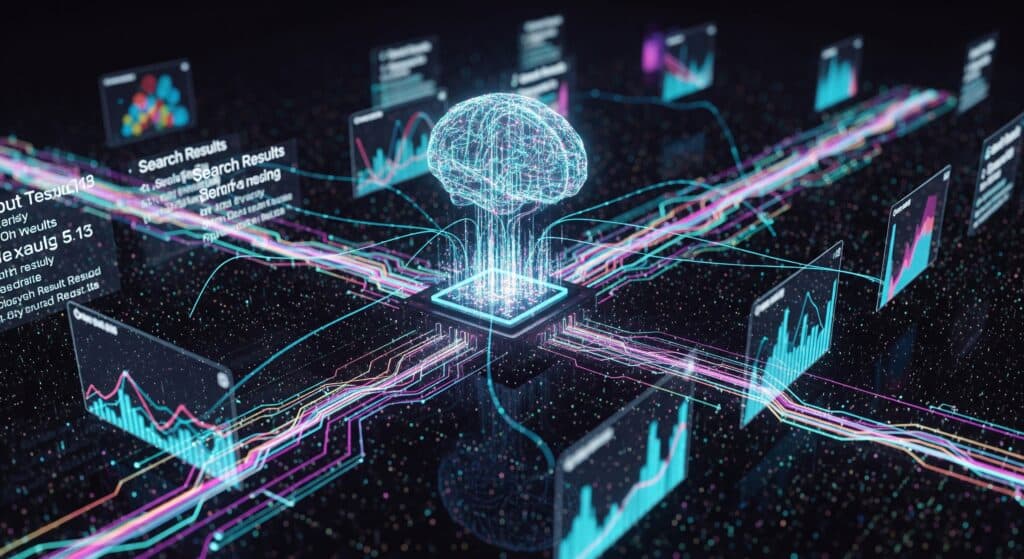It feels like one day, Artificial Intelligence (AI) was a cool concept in sci-fi movies, and the next, it was writing your colleague’s emails. The particular branch causing this seismic shift is Generative AI (GenAI).
This isn’t your average calculator-AI; it’s a sophisticated machine learning system. GenAI is built on what are called Large Language Models (LLMs).
These LLMs are trained on massive datasets of text, code, and other media. This training allows them to understand patterns and structures.
Because of this deep understanding, GenAI doesn’t just process information; it creates entirely new, original output, whether it’s an article, an image, or a piece of code.
Why Does Generative AI Matter to Your Business’s Digital Strategy?
The short answer: it’s fundamentally changing how people find information online.
For decades, the goal of Search Engine Optimization (SEO) was to get your website to the top of the search engine results page (SERP).
The strategy was simple: write good content, build good links, and check your technical SEO boxes.
Generative AI has thrown a wrench into this predictable machine.
It’s forcing a pivotal shift where search engines are increasingly delivering a direct, synthesized “AI Overview” or “Generative Answer” at the very top of the results page.
This new dynamic means your business can no longer rely on the old playbook.
To succeed, you must understand GenAI, leverage its efficiencies, and, crucially, adapt your content to be cited by the very systems that are disrupting traditional search.
The shift is from optimizing for a list of links to optimizing for an AI-generated answer.

How is Generative AI fundamentally different from traditional AI?
To truly grasp the impact of GenAI on SEO, you have to appreciate its unique capabilities. Traditional AI and Machine Learning (ML) primarily excel at tasks like classification and prediction.
Think of traditional AI as a brilliant accountant: it can look at a massive spreadsheet, recognize patterns, and forecast future revenue or flag fraudulent transactions. It processes and interprets existing data.
GenAI, on the other hand, is the brilliant, prolific artist. It doesn’t just analyze; it creates.
It takes a prompt (an input) and generates a coherent, contextually relevant, and novel output that mimics human creativity.
What are the core attributes that define Generative AI?
Generative AI is defined by a few core attributes that directly translate into digital marketing advantages.
1. Creation (Generative) Ability
GenAI’s primary function is to produce brand-new content, whether it’s text, images, or code. Traditional AI, by contrast, is mostly limited to identifying patterns or classifying existing data. This creative capability enables the generation of content at massive scale, from blog drafts to ad copy and product descriptions.
2. Scale and Speed
GenAI can perform complex content tasks in seconds that would take a human hours or days. This dramatically reduces the time-to-market for content, allowing marketers to run rapid experiments and instantly refresh outdated material.
3. Natural Language Understanding
Built on Large Language Models (LLMs), GenAI deeply comprehends and responds to conversational, nuanced human language. This facilitates more sophisticated keyword research and allows for the creation of content that aligns perfectly with how users actually talk or ask questions in search, not just what they type.
4. Hyper-Personalization
GenAI is uniquely capable of tailoring content for individual customer segments based on behavioral data. This ability to deliver hyper-personalized messages, recommendations, and offers boosts both user engagement and conversion rates.
The combination of creation and scale is why Generative AI is now an indispensable tool, and a massive challenge, for every digital marketer.
What does the rise of Generative AI mean for traditional SEO rankings?
The ground is shifting beneath the search engine results page (SERP). The most significant change is the introduction of Generative Search Experiences (GSEs), often appearing as “AI Overviews” or similar features.
These features, powered by GenAI, directly answer a user’s question at the top of the SERP.
How does Generative Search impact clicks?
This shift has a direct and measurable effect on organic search traffic, leading to what marketers call the “zero-click phenomenon.”
- Direct Answers: For many informational queries (e.g., “What is the capital of France?”), the AI provides the answer instantly. The user doesn’t need to click on a website link to get the core information.
- Declining CTRs: As a result, the click-through rates (CTRs) for traditional organic links below the AI answer are expected to decline.
- New Visibility: Visibility is no longer just about the #1 spot in the organic rankings; it’s about being one of the few, authoritative sources that the AI chooses to cite or synthesize for its answer.
Is the old SEO playbook dead?
No, but it needs a serious upgrade. The traditional pillars of SEO are still vital, but the focus has intensified. Here is how your strategy must change:
- From Keyword-First to Intent-First: Traditional SEO heavily focused on matching specific keyword phrases. The GenAI era requires you to prioritize the Intent-First Strategy, which means deeply understanding the why behind the search and providing a comprehensive answer, not just a keyword match.
- From Content Quantity to Quality and Authority: In the past, having more pages meant more chances to rank. Now, success favors a strategy built on Quality and Authority of Content. You need fewer, deeper, and expert-validated pages, not a mass of thin content.
- From Top 10 Ranking to AI Citation: The race for the first organic link is being replaced by the need for AI Citation and Summarization. Your goal is to be the authoritative source that the AI trusts and references in its generative answer.
- From General to Structured Readability: Content used to just need to be easy for a human to read. Now, it must be optimized for Structured Readability so an AI can easily parse, summarize, and extract information.
Your content must be so authoritative and well-structured that the AI cannot provide a comprehensive answer without referencing your work.
How can marketers use Generative AI to scale and enhance content creation?
Generative AI offers immense opportunities for efficiency, turning content creation into a powerful, scalable workflow. It should be seen as an assistant, not a replacement.
The core benefit is reducing the time spent on repetitive or foundational tasks, freeing up human expertise for high-value strategic work.
Where does GenAI deliver maximum efficiency?
1. Content Drafting & Outlining
GenAI can produce a high-quality first draft or a comprehensive, competitor-informed outline in minutes.
- Outline Generation: It quickly creates structured outlines with relevant subheadings based on top-ranking content.
- First Drafts: GenAI generates initial text for blog sections, emails, and product descriptions, effectively eliminating the fear of the “blank page” and accelerating the creative process.
2. Keyword Research and Clustering
AI’s ability to process massive datasets makes it a superior tool for modern keyword strategy.
- Identify Long-Tail Queries: It uncovers more complex, conversational, or question-based keywords that a human might overlook.
- Topic Clustering: GenAI automatically groups related keywords and topics to build “Content Hubs” or “Pillar Pages”. This architecture signals deep topical authority to search engines.
3. Optimization of Micro-Content
This is where speed truly translates to SEO gains, automating small but vital tasks.
- Meta Descriptions & Titles: GenAI can quickly generate and test multiple, compelling meta descriptions and SEO titles to boost CTRs.
- Image Alt Tags: It automates the creation of descriptive, keyword-rich alternative text for images, improving accessibility and image search SEO.
- FAQs & Summaries: GenAI rapidly produces concise, answer-focused snippets perfect for dedicated FAQ sections or for inclusion in the AI’s generated summary.
4. Content Refresh & Gaps
GenAI can analyze your existing content against competitor content and new search trends.
- Gap Analysis: It identifies missing topics, sections, or keywords that could enhance an underperforming article.
- Automated Updates: GenAI can quickly rewrite outdated statistics or introductory paragraphs, extending the lifespan and relevance of your evergreen content.
By automating the “heavy lifting,” marketers can focus their energy on the E-E-A-T factors, infusing content with true human expertise and unique insights.

What are the essential SEO strategies for the Generative AI era?
To successfully navigate the new digital landscape, your SEO strategy must pivot from a keyword-centric approach to one that prioritizes authority, structure, and user trust.
How do you optimize for an AI-powered search engine?
1. Prioritize E-E-A-T (Experience, Expertise, Authority, Trustworthiness)
This Google quality rating is more crucial than ever because AI models are trained to prioritize the most credible sources.
- Showcase Experience: Include proprietary data, original research, case studies, and first-hand accounts that only your team possesses.
- Validate Expertise: Ensure content authors are real experts with clear, linked bios and verifiable credentials.
- Build Authority: Earn high-quality, relevant backlinks and brand mentions from respected third-party sites, as these reinforce your credibility to the AI.
- Ensure Trustworthiness: Maintain factual accuracy, transparently cite all sources, and ensure your website is technically secure.
2. Optimize for Summarization and Conversational Search
Your content must be structured so that GenAI can easily extract the key facts and synthesize the main answer.
- Inverted Pyramid: Lead with the direct, concise answer to the user’s query in the first paragraph.
- Clear Structure: Use strong, question-based subheadings and short, one-to-two-sentence paragraphs. This makes information consumption fast for both humans and AI.
- Use Lists: Employ bullet points and numbered lists liberally; these are the easiest formats for an AI to extract information from.
- Implement Schema Markup: Use structured data (like FAQPage or HowTo schema) to explicitly tell search engines what information is contained within your page.
3. Double Down on Originality and Unique Value
Since GenAI is trained on existing web data, its output often suffers from the “sea of sameness.” Your content must be the original insight that GenAI cannot replicate.
- Hidden Gems: Focus on niche, underserved, or highly specific topics where true human expertise is required to solve a problem.
- Proprietary Data: Publish original surveys, industry reports, or unique data visualizations that only your company has access to.
- Deepen the Analysis: Go beyond the surface-level answer with in-depth analysis, critical perspectives, or a strong, unique opinion based on your expertise.
4. Embrace the Hybrid Workflow (Human + AI)
The best-performing content will be a collaboration between man and machine.
- AI for the Draft, Human for the Polish: Use AI for the initial research, outline, and speed, but employ human editors to check facts, infuse brand voice, and add emotional resonance.
- Prompt Engineering: Learn to write clear, specific, and detailed prompts for your AI tools to ensure the output is targeted and high-quality.
- Fact-Checking is Non-Negotiable: AI “hallucinations” (generating incorrect or misleading information) are a real risk. A rigorous human fact-check process must be the final step before publication.
What are the main ethical and quality challenges when using Generative AI in SEO?
While the potential for efficiency is high, there are significant risks related to quality, originality, and search engine policy that must be addressed with careful human governance.
How do you avoid the pitfalls of AI-generated content?
The most common issues arise when marketers treat AI as a complete, hands-off solution instead of a tool. Here is how you mitigate the risks:
- The “Sea of Sameness” Risk: This occurs when mass-produced, unedited content lacks original insight. Mitigation: Mandate the inclusion of proprietary data, expert commentary, or a unique brand opinion in every piece. Focus on Quality over Quantity.
- AI Hallucinations and Factual Errors: GenAI sometimes generates false or misleading facts that sound confident. Mitigation: Implement a Human Fact-Check Layer. All generated content must be verified and validated by a subject matter expert before publication.
- Brand Voice Disconnect: AI often generates generic content that doesn’t align with a company’s unique tone or values. Mitigation: Train the AI (or the Editor). Provide a clear, detailed brand style guide to the AI as part of the prompt, and have a human editor ensure the tone and style are always on-brand.
- Google Spam Policies Violation: Google explicitly targets “scaled content abuse,” mass-producing low-value content for the sole purpose of ranking. Mitigation: Focus on Added Value. Ensure that every piece of content, regardless of how it was created, provides a clear, beneficial, and unique purpose for the human user.
The most successful brands will be those that view GenAI not as a cost-cutting shortcut, but as a sophisticated productivity tool that enhances the scale of high-quality, human-approved content.
Conclusion: How Generative AI Redefines SEO Success
Generative AI is not a fleeting trend; it is a permanent and disruptive force that is restructuring the foundation of digital search. The era of pure keyword matching is receding, and the new benchmark for success is trust, authority, and structural clarity.
For businesses, the choice is clear: adapt your SEO strategy or risk becoming invisible in a world of AI-generated answers.
Success in the GenAI era is defined by a hybrid approach: leveraging the speed and scale of AI for foundational content while insisting on human expertise, originality, and rigorous quality control to satisfy the highest E-E-A-T standards.
The new mandate for marketers is to become an AI-trusted source, the definitive authority that search engines and AI models turn to for accurate, insightful, and unique information.
Ready to grow your business in the age of Generative AI?
Don’t let the complexity of AI-driven SEO hold you back. Contact Finch today for digital marketing strategies that leverage the power of Generative AI to ensure your business not only survives but dominates the new digital frontier.
FAQ: Generative AI and SEO
What is Generative AI in the context of SEO?
Generative AI (GenAI) refers to advanced machine learning models, primarily Large Language Models (LLMs), that can create new content (text, images, code) in response to a prompt. In SEO, it is used to rapidly draft articles, generate meta descriptions, perform keyword clustering, and analyze competitors. It has become a key tool for content scaling and optimization. Its impact extends to search results as engines use GenAI to produce synthesized, direct answers (“AI Overviews”), fundamentally changing how content is discovered.
Will Google penalize me for using AI-generated content?
Google’s policy is not against AI-generated content per se, but it is strictly against spam and low-quality content. The critical distinction is the value added. If you use AI to “mass-produce content without adding any value for users,” it violates Google’s spam policies (specifically scaled content abuse). However, if you use GenAI as an efficient tool to create a high-quality first draft, which is then thoroughly edited, fact-checked, infused with human expertise (E-E-A-T), and published to serve a clear user need, it can rank successfully. The focus must always be on quality and originality.
What is E-E-A-T and why is it more important in the GenAI era?
E-E-A-T stands for Experience, Expertise, Authority, and Trustworthiness. It is a set of guidelines used by Google’s Quality Raters to evaluate the credibility of content. In the GenAI era, E-E-A-T is more important because AI models are trained to prioritize the most trustworthy and authoritative sources. Since GenAI can easily create generic, unvalidated content, search engines are increasing their emphasis on signals of human experience and subject-matter expertise (e.g., author bios, original research, customer reviews, reputable links). To be cited by an AI Overview, your content must satisfy these high-trust signals.
How does Generative AI affect search engine click-through rates (CTRs)?
Generative AI-powered search features, such as “AI Overviews,” often deliver a complete, synthesized answer directly on the search results page. This leads to the “zero-click phenomenon,” where a user gets their answer without needing to click through to a website. This is expected to cause a decline in organic CTRs for traditional links. The new SEO goal is to structure your content to be the source that the AI pulls from and cites, or to create content so unique and comprehensive that the user is compelled to click for the full, in-depth explanation.
What is the single most important action I can take to adapt my SEO strategy?
The most important action is to shift your content strategy from focusing on what to write to focusing on why your content is unique and authoritative. This means: 1. Injecting Originality: Prioritizing and publishing proprietary research, unique data, or strong, expert-backed perspectives that GenAI cannot reproduce. 2. Improving Structure: Formatting your content with clear, direct answers, bullet points, and proper schema markup so the AI can easily parse and cite your information. 3. Strengthening E-E-A-T: Making sure every piece of content is thoroughly edited by a subject-matter expert to validate experience and trustworthiness.

